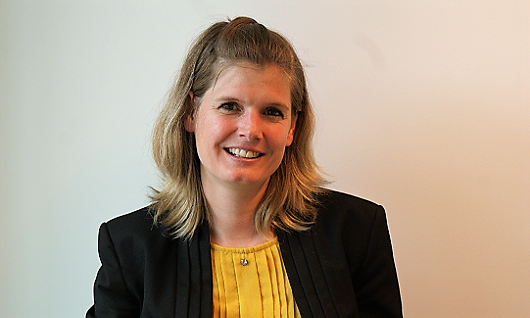How SME Reporting Will Drive Development in Asia: An Interview with Katrin Ochsenbein

Sustainability reporting by small and medium business enterprises (SMEs) can have a big economic impact. We talk to Katrin Ochsenbein, to understand the relevance of sustainability reporting in the Swiss approach to economic development cooperation and trade promotion in Asia.
Katrin is Program Manager in the Trade Promotion Division at the Swiss State Secretariat for Economic Affairs (SECO). Here Katrin explains how improving reporting capacity of SMEs will promote sustainable value chains, and help emerging economies leapfrog in their development.
Can you tell us a bit about the Trade Promotion Division at SECO, and your role within it?
At the Trade Promotion Division at SECO, we implement a vast array of economic development projects in priority countries, be it sustainable cacao production or sustainable tourism development. We also have thematic responsibilities over a vast range of trade promotion aspects, such as trade facilitation, voluntary sustainability standards, and bio-trade.
My role at SECO is three-fold: I manage the trade promotion portfolio in Indonesia; I have the thematic responsibility for the topic of intellectual property; and I’m responsible for some of the global initiatives SECO is funding - one of these being our cooperation with GRI on the Corporate Sustainability and Reporting for Competitive Business (CSRCB) project.
How does GRI sustainability reporting, and the cooperation we have in the CSRCB project, support the strategic goals of your division at SECO?
Within the Trade Promotions Division, we focus most of our efforts on sustainable sector transformation. We focus on a sector within a specific country context, and work towards making it more sustainable along the sector-specific value chains. We try to act from different angles, from production, to distribution, to promotion, to export. The topic of sustainability reporting, which is the core of the CSRCB project, is quite important because it complements our efforts towards strengthening a sector in a sustainable manner, and because it enables companies to actually report on their efforts to address crucial sustainability issues within their sector.
Given your work in Indonesia, what do you think is the relevance of sustainability reporting in the emerging markets of East Asia?
I am obviously coming from a theoretical viewpoint. On a global level, we see that rising demand from customers for sustainable business conduct, prompts global companies to collect sustainability data from all aspects of their operations along their value chains. And because these global companies often source in Asia, there is a growing demand for sustainability reporting in these markets. Consequently, the capacity to do sustainability reporting becomes a competitive differentiator for local companies, especially SMEs – the main focus of our work in the CSRCB project, to be integrated into global value chains and to gain access to new markets and clients.
What motivates your decision to focus particularly on small and medium enterprises (SMEs)?
Swiss economic development cooperation has a traditional focus on SMEs, probably because SMEs are also very important in the Swiss economy. SMEs often contribute substantially to GDP, especially in emerging markets, and to employment. The reason why a lot of our work tends to focus on SME promotion is that by working with SMEs, we can improve the impact of our economic development cooperation. Some studies have also shown that because SMEs are smaller, they tend to react quicker and be more innovative. All this makes them an interesting beneficiary of our work.
What do you think are the main challenges, particularly in emerging markets, to promoting sustainability reporting?
In all these countries, as in most of the affluent countries in Europe, sustainability reporting is only on the rise. We hope to see this accelerate further in the future. But this is also the big challenge, because we believe that change can only happen when there is strong commitment from the top management of a company to pay attention to sustainability issues, to act on them and to report on them. So, in a sense, the challenge is how to turn the topic of sustainability reporting away from a compliance issue towards business development issues. I think this is the main challenge we face, not only in emerging countries, but also globally.
What do you think our approach should be towards tackling this challenge, and how do you see this develop in the future?
Dissemination tools like the GRI Standards – designed to be applied universally – are very helpful in raising awareness about and implementing sustainability reporting. With this knowledge readily available, I think there is an opportunity for local markets to leapfrog in their development, and to make use of the new opportunities and access new markets.
One of six people is working for a global value chain. This fact alone makes such value chains central to addressing development issues. The promotion of sustainable business conduct along value chains in today’s integrated economy will have a visible beneficial impact in the future through a trickle-down effect, leading to systemic change in dealing with sustainability issues.
Through the Corporate Sustainability and Reporting for Competitive Business (CSRCB) program, GRI and the Swiss government help small and medium-sized enterprises in the developing world to gain better access to global value chains through sustainability reporting. To find out more about this program and GRI's other governmental partners, visit our Strategic Partnerships page.
Click here to subscribe to GRI's monthly newsletter.

